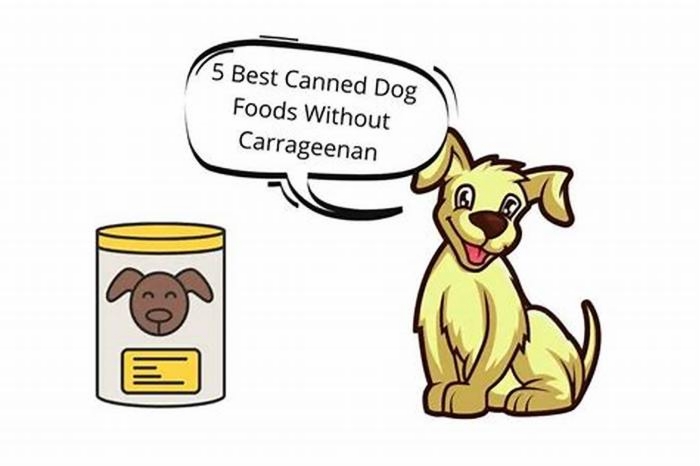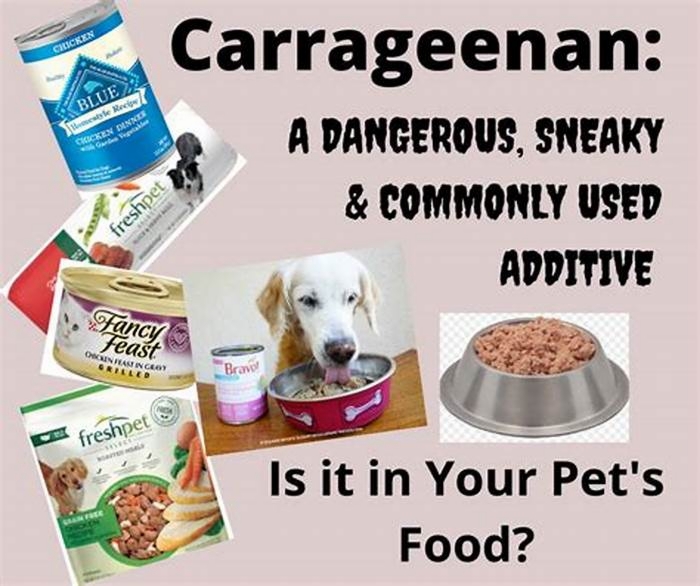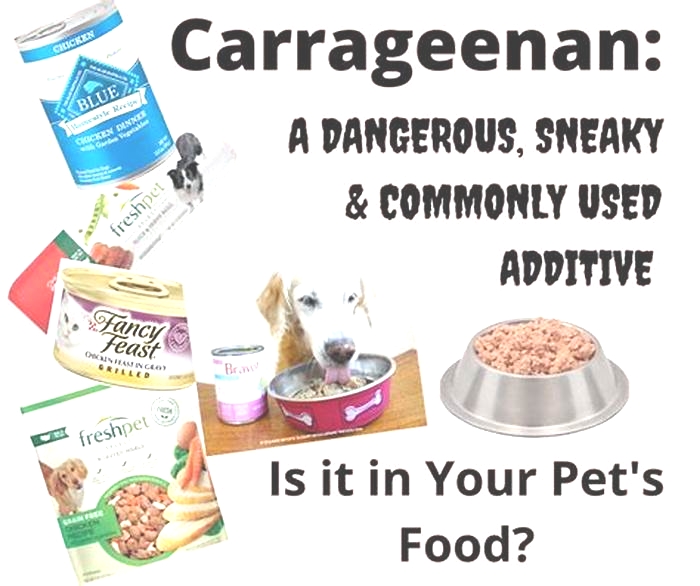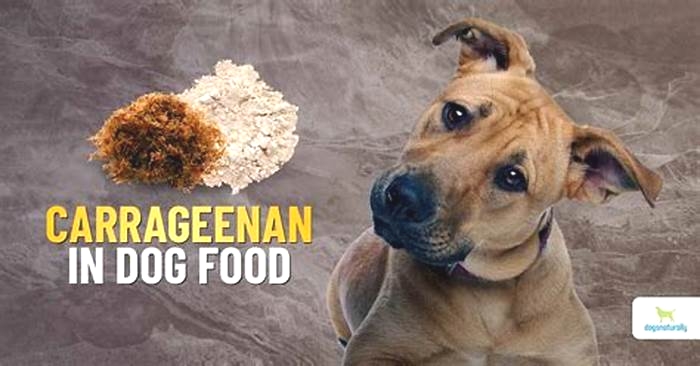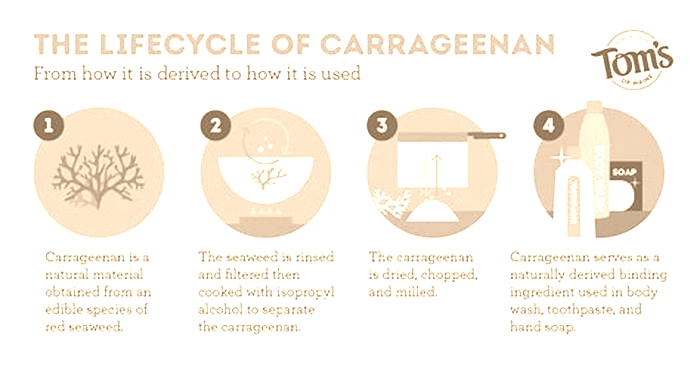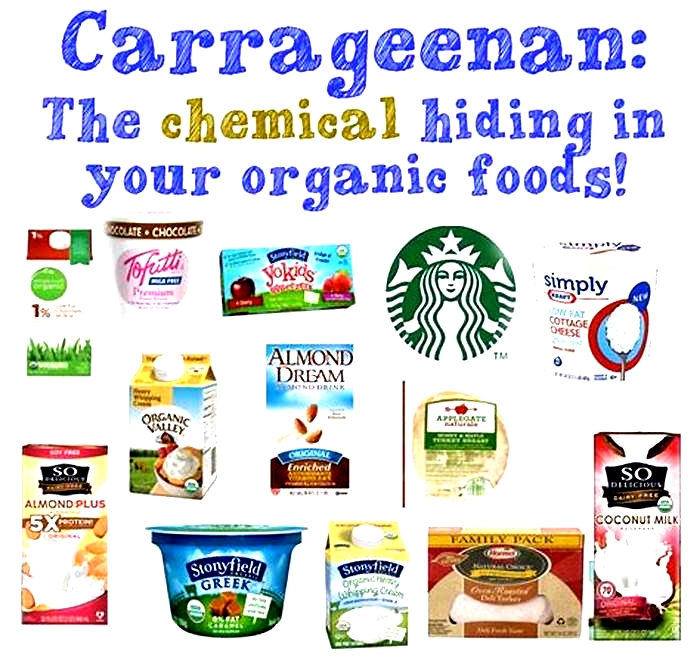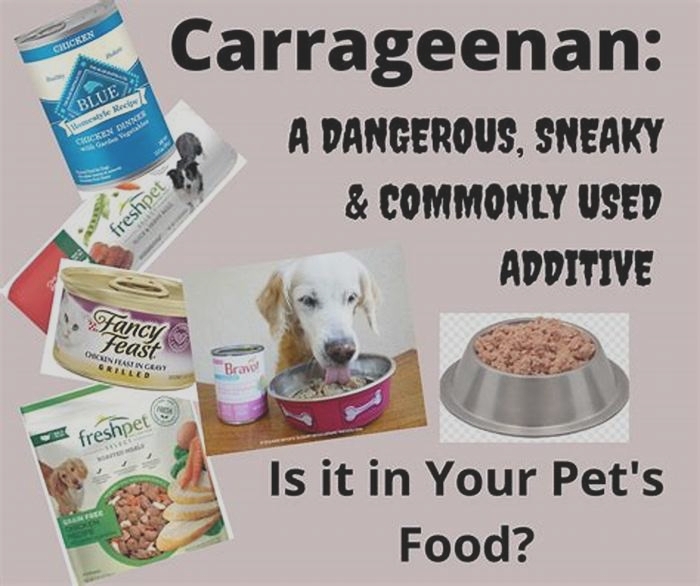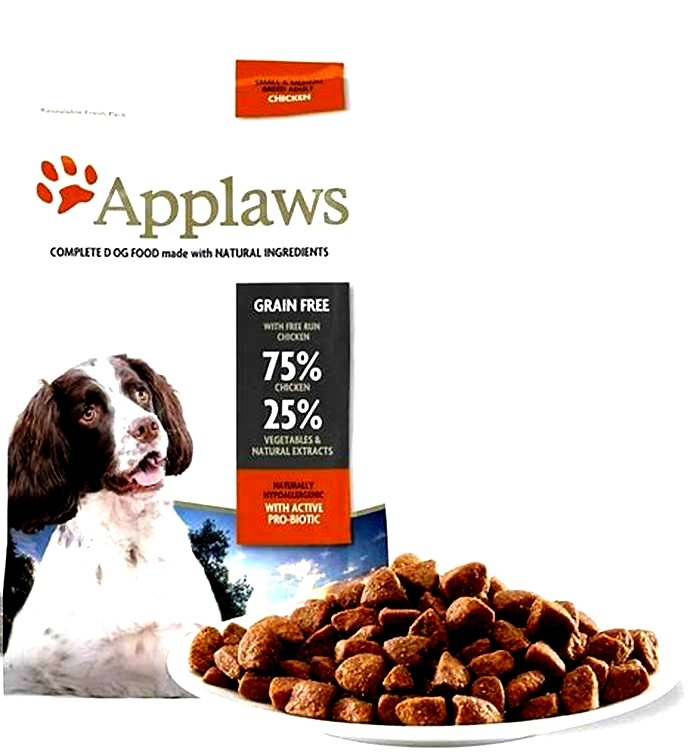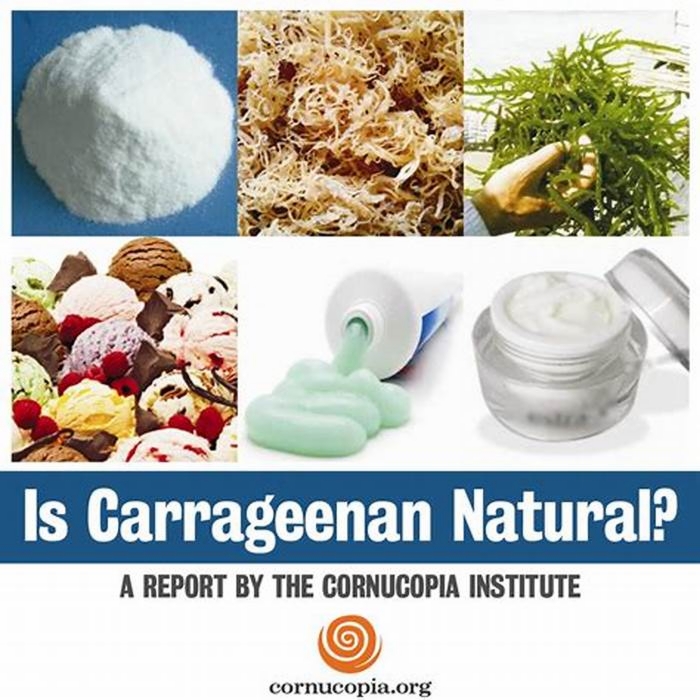Is carrageenan OK in dog food
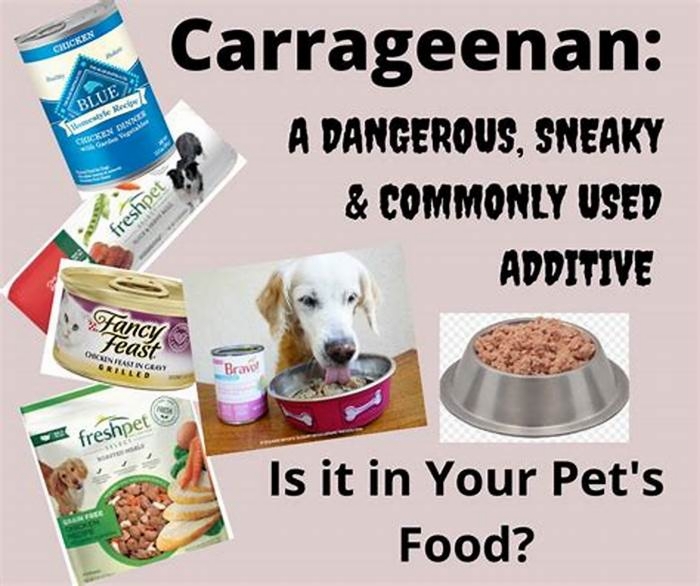
Carrageenan In Dog Food
What Is Carrageenan?
Carrageenan is a carbohydrate structure that is derived from red edible Seaweed. The process to create Carrageenan from Seaweed involves combining it with an Alkali.
What confuses many is that Carrageenan has multiple spellings, but they are almost always the same ingredient. Examples of alternative spelling that is commonly seen include Carageenan, Carrageenan, and Carrigeenin.
One of the most crucial facts about Carrageenan is that it offers little to no nutrition, including a negligible portion of protein, fat, and carbohydrates.
Also, Carrageenan does not offer any notable quantity of any required vitamins or minerals for dogs or cats.While it is most commonly found in pet food recipes, Carrageenan can sometimes be found in human food as well.
Examples of products for human consumption that may contain Carrageenan include Ice Cream, Milkshakes, and other desserts.
Carrageenan In Dog Food
Carrageenan is most commonly used as an ingredient in canned, wet, or moist dog food as well as cat food.Some research that we found would say that at one point in time, as much as seventy percent of commercially produced canned dog food included Carrageenan in varying quantities.
However currently, this percentage is estimated to be far lower, but it is still a significant proportion.
Carrageenans essential purpose in dog food recipes is to act as a thickening agent to bind the ingredients together and give the food a consistent texture and appearance.
Thickening agents are important components in canned pet food as if they are absent, this can cause the protein-rich ingredients present to become unappealing or to have an unpleasant texture.
Thickening agents can also be described as binding agents, emulsifiers, gelling agents, or stabilizers.
While these terms mean slightly different things, it is safe to bundle them together when they are mentioned in relation to pet food, as they are very similar.
Some alternative thickening agents or binding agents that are commonly found in pet food recipes include starches, like Potato Starch and Tapioca Starch, or gum-like ingredients, such as Xanthan Gum and Guar Gum.
Risks of Carrageenan
While opinions are mixed, some studies have shown that Carrageenan can cause several health problems in dogs, including Gastrointestinal Inflammation as well as increased rates of intestinal lesions, ulcerations, and in extreme cases, malignant tumors.
The malignant tumors are particularly concerning for dogs owners as these can be cancerous.
However, the cause of these health issues is a by-product that is produced from the Carrageenan production process known as poligeenan.
Poligeenan is the low-molecular form of Carrageenan, which can be harmful, and Poligeenan is the cause of the symptoms mentioned above.
The reason that some dogs experience these symptoms is due to an immune response that some dogs will inhibit after digesting Carrageenan.
This immune reaction is the cause of the inflammation, and then sustained inflammation is then the cause of the more severe side effects.
However, Poligeenan is supposed to be separated and removed from the Carrageenan during production, but some believe this doesnt always take place or isnt 100% effective.
There are strong opinions by some pet food bloggers and enthusiasts that Carrageenan has no place in dog food and would go as far as to say that it should be banned.
One very strong example to support this sentiment is that Carrageenan has been banned for use in baby formula or baby food in the European Union, which is often a world leader in identifying harmful substances.
While this ban was precautionary and not fully substantiated, it does give a strong suggestion that Carrageenan could be harmful.
Moreover, in 2016, the use of Carrageenan was banned in the United States for foods that are categorized as Organic.
Many in the industry were disappointed at this decision and claimed that it would result in fewer organic options available for consumers.
Dog Food Brands That Use Carrageenan
Carrageenan is one of the most common ingredients in wet dog food recipes and is used by a number of well-known and established dog food brands.
In fact, while researching the use of ingredients in dog food recipes, we found that of the 100 most popular wet dog food recipes on Chewy.com, 48 of them contained Carrageenan as an ingredient, which is almost a majority.
However, this pales in comparison to Guar Gum which was found in 73 of the 100 recipes but is comfortably above others like Xanthan Gum or Cassia Gum.
Some examples of pet food brands that use Carrageenan that you may recognize include Pedigree, Rachael Ray Nutrish, FreshPet, Wellness, Blue Buffalo, Newmans Own, Nutro, Purina Pro Plan, Purina One, Royal Canin, and Hills Science Diet.
The inclusion of Purina, Royal Canin, and Hills in this list is significant as these three brands are considered the leaders of the industry and perform the most research on formulation and ingredients.
Their continued use of Carrageenan, despite its controversy, shows that they believe it is an appropriate dog food ingredient.
You can see an example of the use of Carrageenan in a dog food recipe below, where it is featured in the ingredient list of Purina Pro Plans Classic Adult Complete Essentials Chicken & Rice Entree recipe.
In this recipe, Carrageenan is present in a very small quantity, even below salts, but is alongside Guar Gum, and these two ingredients act in unison to bind the food together.
However, as we eluded to earlier, Carrageenans use has seen some decrease in recent years as some brands have chosen to move away from it and use alternatives that are deemed safer or more natural.
Some brands have taken this to the extreme and have gone as far as to display or advertise that their products are Carrageenan-free.
If you wish to avoid Carrageenan or other thickening agents entirely, then it may be wise not to feed your dog canned or wet dog food.
While dry dog food is far from perfect, it does not require thickening agents such as Carrageenan and instead relies on vegetable ingredients like Legumes and Starches.
Should You Remove Carrageenan from Your Diet?
Carrageenan is a common food additive but it may cause digestive side effects and has a potential link to colon cancer. While more research is needed, you may want to remove it from your diet.
Carrageenan is an additive used to thicken, emulsify, and preserve foods and drinks. Its a natural ingredient that comes from red seaweed (also called Irish moss). Youll often find this ingredient in nut milks, meat products, and yogurt.
Since the late 1960s, theres been controversy surrounding the health effects of carrageenan. Some evidence suggests that carrageenan triggers inflammation, gastrointestinal ulcerations, and that it damages your digestive system. People have been petitioning for products with carrageenan to be labeled with a warning or removed entirely. Read on to learn more about this common food additive and why you may want to avoid it.
Products with carrageenan may be labeled as natural, but limited studies show that carrageenan may promote or cause:
Increased inflammation can lead to a greater likelihood of other diseases, such as:
One
But many of the studies conducted on the dangers of carrageenan were on animals and cells. Reports of bloating, irritable bowel syndrome, and other digestive issues are mostly self-reported. People also report relief when they drop carrageenan from their diet.
There need to be more human studies to confirm any link between carrageenan and digestive problems. In the meantime, you may want to limit how much carrageenan you consume.
The Food and Drug Administration still approves this ingredient. But in 2016, the National Organic Standards Board voted to remove carrageenan from their approved list. This means foods made with carrageenan can no longer be labeled USDA organic.
Carrageenan tends to be in vegan and vegetarian products. Since its a plant, manufacturers use it to replace gelatin, which is made from animal parts.
Carrageenan has no nutritional value, so you dont have to worry about missing anything when you remove foods containing it. Finding replacements for vegetarian or vegan foods without carrageenan is possible. Just remember that carrageenan-free milks may separate. This is natural. All you have to do is shake well before pouring.
To see which brands are carrageenan-free, take a look at Cornucopias shopping guide. Carrageenan is also found in pet foods, especially canned ones. Choose a brand that does not contain this additive.
If youre worried about the side effects of carrageenan, take it out of your diet and see if theres any improvement in how youre feeling. Its legally required to be listed under a products ingredients, so it should be easy to start to figure out what foods to eliminate.
Talk to a doctor if you continue to experience inflammation or digestive issues after removing carrageenan. This may signal that carrageenan isnt responsible for your symptoms.
Read more: The ultimate guide to every kind of milk
What is Carrageenan in Dog Food?
This post may contain affiliate links. It doesn't cost you anything extra and it keeps our lights on, our families fed, and our dogs spoiled.For all the juicy fine print, see our affiliate disclosureChoosing the best dog food can be tough, especially when you dont know what all the various ingredients mean.
Pet food companies arent strictly regulated. Thats why its important for you to check the white label on the back of the packaging.
Research all the ingredients present in your pets kibble to make sure its safe. One ingredient youll often see is carrageenan.
But is this ingredient actually healthy and safe for your pet to eat?
Continue reading this article to find out more about it.
- What is it?
- Is it good or bad for your pet?
- And should you buy dog food with Carrageenan in it?
What is Carrageenan in Dog Food?

Carrageenan is a common emulsifier included in many human and pet foods alike.
It is used within wet foods and serves as an additive[1] to thicken, fill up, and emulsify the food.
It comes in two different forms, degraded and undegraded.
Undegraded carrageenan is most commonly used as an additive in various dog foods.
Related: What is Pea Protein in Dog Food? Is it Safe for Dogs?
Is Carrageenan Good for Dogs?
Carrageenan itself is not a digestible substance[2] for dogs or humans. Your pets digestive system cannot process any of it in their kibble.
Naturally, this means it offers absolutely no nutritional value when consumed.
Moreover, carrageenan does not contain any fiber or roughage (ruff-age?). So it does not provide any digestive benefits to the dog either.
It offers no benefit to dogs, nutritional or otherwise. But is it harmful to your pet? Lets find out!
Is Carrageenan Bad for Dogs?
Since Carrageenan is so common in processed human and pet foods, there is a vast amount of research on it.
Over the past decade, there have been several important discoveries about it.
Much of the discourse has been negative, calling into question its safety.
Firstly, carrageenan has been found to cause inflammation within the digestive tract[3].
This can cause short-term problems such as pain and an upset stomach and long-term problems like ulcers and lesions.
Moreover, research shows[4] that carrageenan is a potential carcinogen, and excessive consumption can cause colon cancer.
Some research suggests[5] that this substance can lead to Alzheimers within human beings. Thus it might also impact the cognitive function of mans best friend.
There have been strong calls for companies to stop adding carrageenan in dog food.
Yet, so far, pet food companies have resisted this pressure. Instead, they argue that the negative health effects only apply to degraded carrageenan.
Yet, there is no evidence putting undegraded carrageenan in the clear!
Thus, all the evidence points to the fact that Carrageenan is bad for dogs.
It can lead to serious health issues both in the short and long term if it is a regular part of the animals diet.
Related: What is Crude Protein in Dog Food? Is it Safe?
Sources of Carrageenan in Dog Food
There are two primary sources of carrageenan used within the pet food industry.
The first is dairy products and substitutes such as cheese, cow milk, and even coconut milk.
The second is processed seaweed.
This is the most common source in animal feeds, such as dog food.
The industry normally processes seaweed and extracts carrageenan from it.
This serves as an emulsifier for many wet foods pet owners feed their animals.
How Much Carrageenan Do Dogs Need?
Carrageenan does not offer any proven benefits, nutritional or otherwise.
In fact, consuming this substance may cause a wide variety of health problems for the animal.
Due to this fact, we recommend that dogs do not consume carrageenan at all. Therefore, if possible, make sure your pet is not eating food with carrageenan in it.
Now that you are better informed regarding the negative health effects of carrageenan, you are better equipped to make the right choice and avoid any foods with this harmful ingredient, thus, keeping your four-legged companion happy and healthy for years to come.
Related: What is Alfalfa Meal in Dog Food? Is it a Good Protein Source?
Dog Foods With Carrageenan
If you are looking for wet dog foods for your canine friend, here are a few that contain Carrageenan.
Always try your best to avoid these!
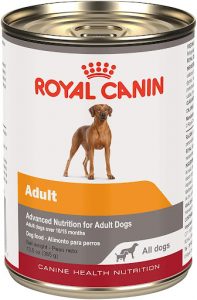
This recipe contains real chicken and pork, which makes it appear healthy.
However, lower on the ingredient list, youll see carrageenan. That means you should keep it far away from your pet!
Related: What is Copper Sulfate in Dog Food? Is it Safe for Dogs?
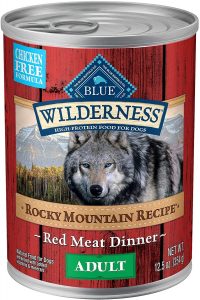
Despite the fact that this Blue Buffalo recipe markets itself as being high in protein and particularly suitable for dogs, it also contains carrageenan and should be avoided at all costs.
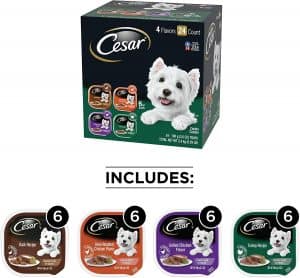
Sorry, Cesar, there is nothing Gourmet about inflaming your dogs organs and risking cancer.
This formulation is another one that any responsible pet owner should steer clear of.
Dog Foods Without Carrageenan
If you still need a wet food treat for your dog, then there are a plethora of carrageenan-free options to consider on the market.
Here are a few healthy options that your pet can safely enjoy.
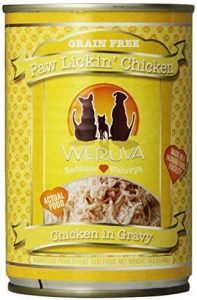
This option contains whole pieces of boneless and skinless chicken breast. Rich in protein, it provides your pet with all the nutrients it needs.
In addition to not having carrageenan, this dog food has no additives making it a healthy treat.
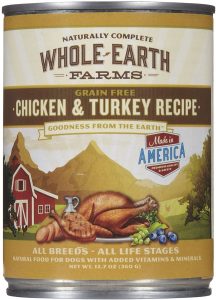
This option is free from both grains and carrageenan. All in all, it is a great option for pets with sensitive stomachs.
Moreover, additional vitamins supplement the protein. The formula will help bolster your pets immunity.
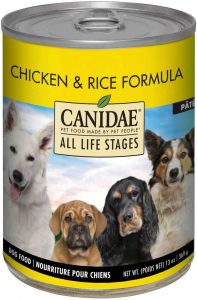
If your furry friend has no issues consuming grains, then this is another suitable option. It is primarily composed of rice and chicken.
Also, there are no harmful additives like Carrageenan, making it a suitable option.
Conclusion
All in all, carrageenan is a terrible ingredient for dog food. It doesnt add any value.
In fact, it can cause terrible diseases like cancers and digestive inflammation. Thats why it is up to you to read the labels carefully.
Always make sure you know what youre feeding your dog. And if you see a brand selling kibble with carrageenan, beware!
Resources
- https://www.healthline.com/health/food-nutrition/carrageenan
- https://pubmed.ncbi.nlm.nih.gov/12389870/
- https://www.ncbi.nlm.nih.gov/pmc/articles/PMC8539934/#:~:text=Studies%20conducted%20in%20mice%20demonstrated,composition%20%5B29%2C30%5D.
- https://www.ncbi.nlm.nih.gov/pmc/articles/PMC1242073/
- https://www.medicalnewstoday.com/articles/323117

